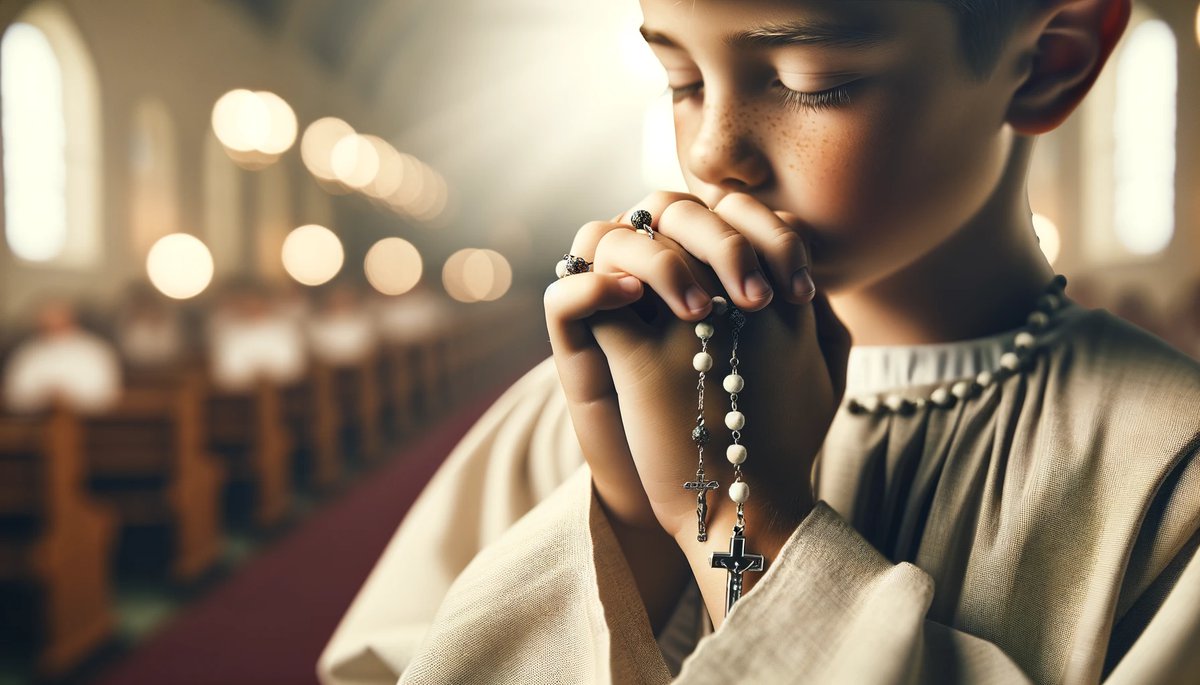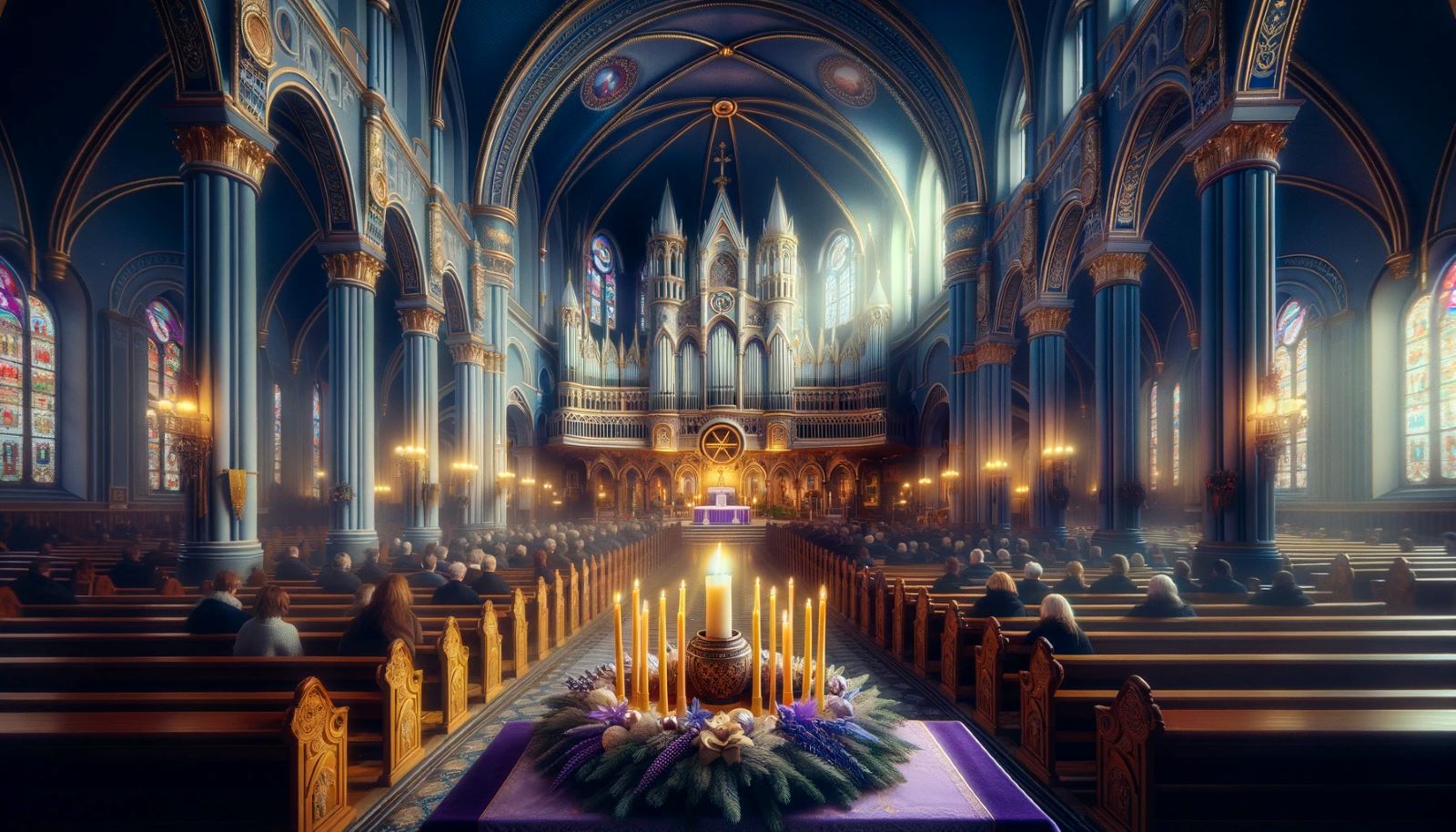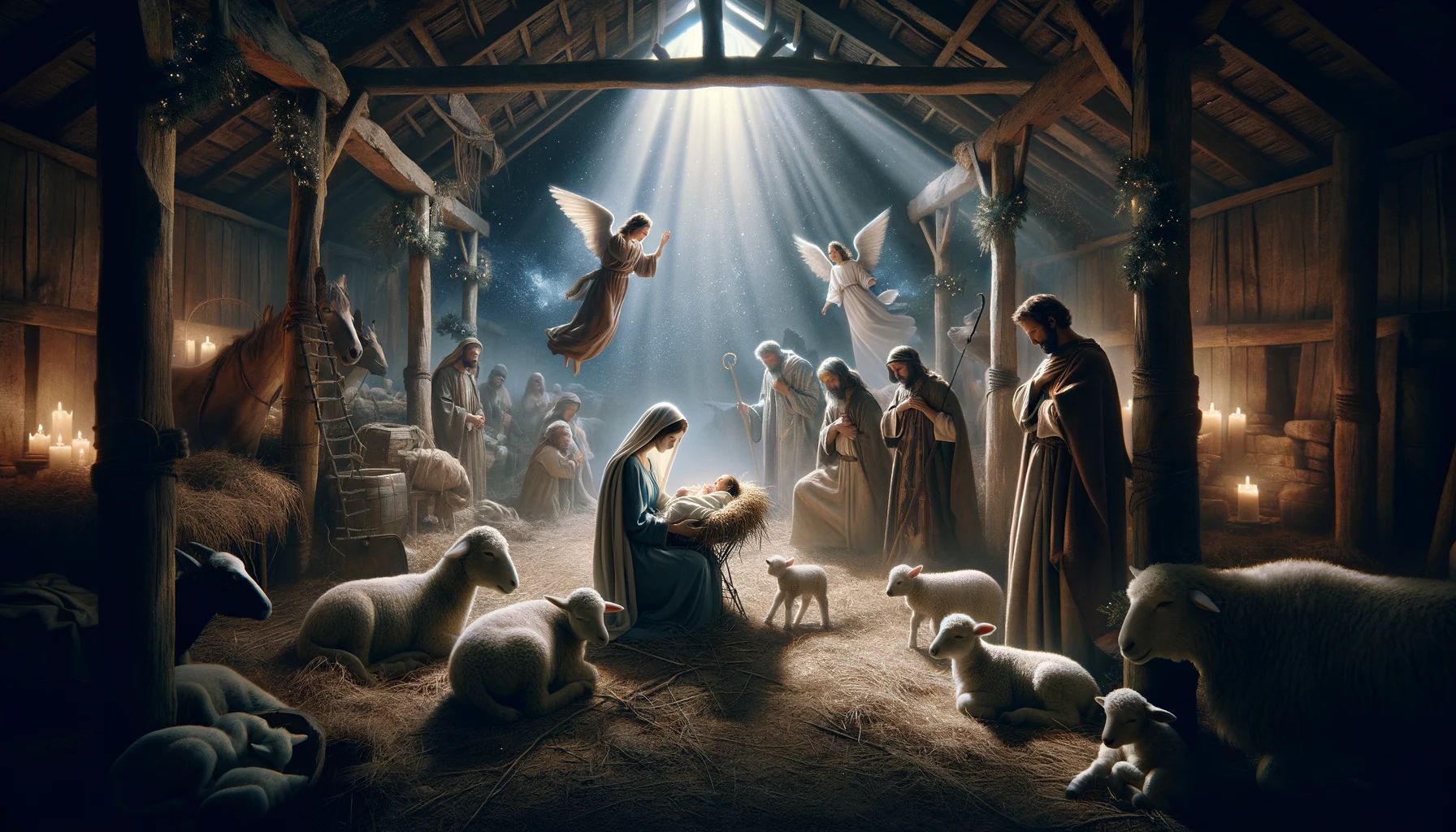Home>Special Themes>When Is The First Week Of Advent


Special Themes
When Is The First Week Of Advent
Published: February 14, 2024
Ericka Andersen, an editor at Christian.net, expertly merges digital strategy with content creation, focusing on faith and societal issues. Her communication skills enhance the platform's engaging narratives, fostering meaningful dialogue on belief's impact on society.
Discover the significance of the first week of Advent and its special themes. Learn how to observe this sacred time with meaningful traditions and reflections.
(Many of the links in this article redirect to a specific reviewed product. Your purchase of these products through affiliate links helps to generate commission for Christian.net, at no extra cost. Learn more)
Table of Contents
Introduction
Advent, a word derived from the Latin "adventus," meaning "coming" or "arrival," marks the beginning of the liturgical year in Western Christianity. It is a time of spiritual preparation and anticipation for the celebration of the birth of Jesus Christ at Christmas. The Advent season is a period of joyful expectation, reflection, and hope, inviting believers to embrace the true meaning of Christmas beyond the materialistic aspects.
During this sacred time, Christians around the world engage in various traditions and rituals that symbolize the spiritual significance of Advent. From lighting the Advent wreath to partaking in special prayers and devotions, the season fosters a sense of communal unity and spiritual introspection.
As we delve into the history, meaning, and traditions of Advent, we will uncover the profound significance of this season and gain a deeper understanding of its impact on individuals and communities worldwide. Let's embark on a journey to explore the rich tapestry of Advent, delving into its historical roots, its symbolic representations, and the timeless customs that continue to enrich the lives of believers across generations.
Read more: When Is The First Sunday In Advent
The History of Advent
The history of Advent can be traced back to the early centuries of Christianity, evolving over time to become a cherished tradition within the faith. The origins of Advent can be linked to the early Christian practices of fasting and preparation for the celebration of the Nativity of Jesus. While the specific customs and duration of Advent varied in different regions, the central theme of spiritual readiness and anticipation remained constant.
The earliest recorded observance of Advent dates back to the 4th and 5th centuries in Gaul (modern-day France), where Christians engaged in a period of fasting and penitence leading up to the feast of Epiphany. This preparatory period, lasting anywhere from three to six weeks, was characterized by solemnity and introspection, setting the stage for the joyous celebration of Christ's birth.
By the 6th century, the practice of Advent had spread to other parts of Western Europe, with the duration of the season standardized to four weeks. During this time, the focus of Advent shifted from preparing for Epiphany to preparing for Christmas, aligning with the growing emphasis on the birth of Christ as a central event in the liturgical calendar.
The structure of Advent as a four-week season became more formalized in the medieval period, with the introduction of Advent wreaths and the use of specific liturgical colors, such as purple and rose, to symbolize penitence and joy. The theological significance of Advent also deepened during this time, emphasizing the dual nature of Christ's coming – the anticipation of his historical birth and the anticipation of his future return in glory.
In the 20th century, the Second Vatican Council brought further reforms to the observance of Advent, emphasizing the themes of hope, peace, joy, and love through the liturgical readings and prayers. This renewed focus on the spiritual dimensions of Advent has continued to shape the contemporary observance of the season, inspiring believers to engage in acts of charity, prayer, and reflection as they await the celebration of Christ's birth.
Today, the history of Advent stands as a testament to the enduring significance of spiritual preparation and anticipation in the Christian faith. As the season unfolds each year, it serves as a poignant reminder of the timeless traditions and profound theological truths that continue to enrich the lives of believers around the world.
The Meaning of Advent
Advent holds profound significance within the Christian faith, encapsulating a multifaceted tapestry of spiritual themes and theological truths. At its core, Advent represents a period of joyful expectation and hopeful anticipation, serving as a poignant reminder of the central message of Christmas. It is a time when believers are called to reflect on the profound mystery of the Incarnation – the divine act of God taking on human form in the person of Jesus Christ.
The essence of Advent is intricately woven with themes of hope, peace, joy, and love, each symbolized by the four candles of the Advent wreath. As the season unfolds, the lighting of these candles serves as a visual representation of the gradual illumination of the world by the light of Christ, culminating in the radiant celebration of his birth on Christmas Day.
Furthermore, Advent serves as a spiritual journey, inviting believers to prepare their hearts and minds for the coming of Christ. It is a time of introspection and renewal, prompting individuals to rekindle their faith, embrace the virtues of patience and perseverance, and cultivate a spirit of generosity and compassion towards others.
The season of Advent also carries a prophetic dimension, echoing the ancient promises of the Messiah's arrival and the fulfillment of God's redemptive plan for humanity. Through the readings and liturgical prayers of Advent, believers are immersed in the rich tapestry of Old Testament prophecies, underscoring the continuity between the ancient longing for the Messiah and the fulfillment of that longing in the person of Jesus Christ.
Moreover, Advent serves as a counter-cultural reminder amidst the hustle and bustle of the secular holiday season. It calls individuals to transcend the materialistic trappings of Christmas and embrace the spiritual significance of Christ's birth. In a world often marked by consumerism and superficiality, Advent stands as a beacon of spiritual depth and contemplative reverence, inviting believers to seek a deeper connection with the divine amidst the festivities.
In essence, the meaning of Advent transcends mere historical commemoration; it embodies a profound invitation to embrace the transformative message of Christ's coming into the world. It is a season of profound significance, weaving together the threads of ancient prophecies, spiritual renewal, and joyful anticipation, ultimately leading believers to encounter the timeless truth of God's love made manifest in the birth of Jesus Christ.
The Start of the Advent Season
The commencement of the Advent season heralds a period of spiritual significance and anticipation within the Christian calendar. Advent traditionally begins on the fourth Sunday before Christmas, marking the start of the liturgical year in Western Christianity. This timing allows for a period of approximately four weeks leading up to the celebration of Christ's birth on December 25th.
The first day of Advent holds a special place in the hearts of believers, as it signifies the beginning of a sacred journey towards Christmas. It serves as a symbolic threshold, inviting individuals and communities to enter into a season of spiritual preparation, reflection, and joyful expectation. The transition into Advent is often accompanied by the lighting of the first candle on the Advent wreath, symbolizing the dawning of hope and the anticipation of Christ's coming.
As the Advent season unfolds, the liturgical readings and prayers during this time emphasize the themes of hope, peace, joy, and love, inviting believers to immerse themselves in the profound significance of Christ's birth. The start of Advent also marks the onset of various cherished traditions and customs, such as the singing of Advent hymns, the display of Nativity scenes, and the practice of daily devotions and prayers focused on the anticipation of Christ's arrival.
Moreover, the start of Advent serves as a poignant reminder of the dual nature of Christ's coming – the historical commemoration of his birth in Bethlehem and the eschatological anticipation of his second coming. This duality infuses the season with a sense of profound mystery and expectation, prompting believers to contemplate the enduring significance of Christ's presence in their lives and the promise of his eventual return in glory.
The start of Advent also carries a message of spiritual renewal and reawakening, calling individuals to prepare their hearts and minds for the coming of Christ. It encourages believers to embrace the virtues of patience, humility, and generosity, fostering a spirit of compassion and goodwill towards others. This period of introspection and anticipation sets the stage for a deeper, more meaningful celebration of Christmas, rooted in the spiritual truths embodied by the Advent season.
In essence, the start of the Advent season marks a pivotal moment in the Christian calendar, inviting believers to embark on a transformative journey of faith, hope, and joyful anticipation. It sets the stage for a season of spiritual enrichment, communal unity, and a renewed focus on the profound significance of Christ's birth, inspiring individuals to embrace the true essence of Christmas with hearts aglow with hope and love.
When Is the First Week of Advent?
The first week of Advent marks the commencement of this sacred season of anticipation and spiritual preparation within the Christian calendar. It begins on the Sunday closest to November 30th and extends through the following Saturday, setting the stage for the unfolding of the Advent journey. This timing allows for a period of approximately seven days, during which believers engage in meaningful rituals and reflections that encapsulate the essence of Advent.
The specific date for the start of the first week of Advent varies each year, as it is determined by the proximity of November 30th to the following Sunday. This variability adds a sense of anticipation and unpredictability to the Advent season, echoing the themes of hopeful expectation and joyful surprise that characterize the period leading up to Christmas.
As the first week of Advent unfolds, believers are invited to immerse themselves in the themes of hope and anticipation, symbolized by the lighting of the first candle on the Advent wreath. This act serves as a visual representation of the gradual illumination of the world by the light of Christ, infusing the atmosphere with a sense of spiritual warmth and anticipation.
The liturgical readings and prayers during the first week of Advent emphasize the prophetic promises of the Messiah's arrival, underscoring the enduring significance of Christ's birth as a fulfillment of ancient prophecies. This period of reflection and anticipation sets the tone for a deeper engagement with the spiritual dimensions of Christmas, prompting believers to embrace the virtues of patience, hope, and joyful expectation.
Moreover, the first week of Advent serves as a call to spiritual renewal and reawakening, inviting individuals to prepare their hearts and minds for the coming of Christ. It fosters a spirit of introspection and contemplation, prompting believers to rekindle their faith and embrace the timeless message of hope and redemption embodied by the Advent season.
In essence, the first week of Advent represents a pivotal moment in the Christian calendar, signaling the beginning of a transformative journey towards Christmas. It sets the stage for a season of spiritual enrichment, communal unity, and a renewed focus on the profound significance of Christ's birth, inspiring individuals to embrace the true essence of Christmas with hearts aglow with hope and love.
Read more: When Is The First Day Of Advent 2024
Traditions and Customs of the First Week of Advent
The first week of Advent heralds the commencement of cherished traditions and customs that hold deep spiritual significance within the Christian community. As believers embark on this sacred journey of anticipation and preparation, they engage in a tapestry of rituals and practices that enrich the Advent experience and foster a sense of communal unity.
One of the central customs of the first week of Advent is the lighting of the first candle on the Advent wreath. This symbolic act represents the dawning of hope and the anticipation of Christ's coming, infusing the atmosphere with a sense of spiritual warmth and expectation. The candle, often adorned with the color purple, serves as a visual reminder of the prophetic promises of the Messiah's arrival, inviting believers to reflect on the enduring significance of Christ's birth.
In addition to the lighting of the Advent candle, the first week of Advent is marked by the singing of traditional hymns and carols that capture the themes of hope, anticipation, and joyful expectation. These musical expressions serve as a poignant reminder of the spiritual journey unfolding during the Advent season, inspiring believers to immerse themselves in the timeless melodies that encapsulate the essence of Christmas.
Furthermore, the display of Nativity scenes and the setting up of Advent calendars are cherished customs that come to life during the first week of Advent. The Nativity scene, depicting the birth of Jesus in Bethlehem, serves as a visual representation of the central message of Christmas, inviting believers to contemplate the profound mystery of the Incarnation. Advent calendars, often filled with daily reflections, scriptures, or small treats, provide a tangible way for individuals and families to mark each day of the season with joyful anticipation and spiritual contemplation.
The first week of Advent also sets the stage for the practice of daily devotions and prayers focused on the themes of hope, peace, joy, and love. These spiritual exercises foster a spirit of introspection and renewal, prompting believers to prepare their hearts and minds for the coming of Christ. Through these devotional practices, individuals are invited to embrace the virtues of patience, humility, and generosity, cultivating a deeper connection with the spiritual dimensions of Christmas.
In essence, the traditions and customs of the first week of Advent encapsulate the profound significance of this sacred season, inviting believers to embark on a transformative journey of faith, hope, and joyful anticipation. These cherished rituals and practices serve as a testament to the enduring spiritual richness of Advent, fostering a sense of communal unity and a renewed focus on the profound significance of Christ's birth.
Conclusion
As we draw the curtains on our exploration of Advent, we are reminded of the profound significance of this sacred season within the Christian faith. Advent, with its rich historical roots, embodies a tapestry of spiritual themes and traditions that continue to resonate with believers across generations. It serves as a poignant reminder of the central message of Christmas, inviting individuals to embrace the true essence of the season beyond the materialistic trappings.
The history of Advent, spanning centuries of Christian tradition, reflects the enduring importance of spiritual preparation and anticipation in the journey towards Christmas. From its early origins of fasting and penitence to the formalization of a four-week season, Advent has evolved while retaining its core emphasis on the anticipation of Christ's coming.
The meaning of Advent, intricately woven with themes of hope, peace, joy, and love, encapsulates the profound invitation to embrace the transformative message of Christ's birth. It serves as a spiritual journey, prompting believers to prepare their hearts and minds for the coming of Christ while reflecting on the ancient promises of the Messiah's arrival.
The start of the Advent season, marked by the first week of Advent, sets the stage for a period of spiritual enrichment and communal unity. It symbolizes the beginning of a transformative journey towards Christmas, fostering a renewed focus on the profound significance of Christ's birth and inspiring individuals to embrace the true essence of the season with hearts aglow with hope and love.
The traditions and customs of the first week of Advent, from the lighting of the Advent candle to the singing of traditional hymns and the display of Nativity scenes, enrich the Advent experience and foster a sense of communal unity. These cherished rituals serve as a testament to the enduring spiritual richness of Advent, inviting believers to embark on a transformative journey of faith, hope, and joyful anticipation.
In conclusion, Advent stands as a timeless testament to the enduring significance of spiritual preparation and anticipation within the Christian faith. As believers around the world embark on this sacred journey each year, they are reminded of the profound message of hope, peace, joy, and love embodied by the Advent season, inviting them to embrace the transformative message of Christ's birth with hearts aglow with anticipation and reverence.














